Georgia Adams: ‘Cricket needs LGBT+ role models – Steven Davies has my respect’
In a wide-ranging interview, the Southern Vipers captain talks to Danyal Khan about LGBT+ History Month, her forthcoming wedding, and why Steven Davies will always be a trailblazer…

Where are the LGBTQ+ role models in cricket performing at the highest level on and off the pitch?
Look no further than Southern Vipers captain Georgia Adams, who oozes class and professionalism with her humble and down-to-earth personality.
It’s a personality that’s enabled her to open up to Hannah Thompson and me on the Women’s Cricket Chat (@WCricketChat).
Adams possesses all the traits needed to become a true role model to young LGBTQ+ girls who dream of becoming a professional.
“I don’t know if I had any real role models,” she admits. “When I was a young cricketer, I was in and around a lot of the players who were older than me and we had some couples in the side as well.
“There was that fine line as a teenager to understanding that people are different.
“I learned more growing up to help me understand that people are different and we should embrace these differences.
“And yes, I want to be a role model to younger girls, because I want people to understand that sport is for everyone and if I can help as a role model, then that is amazing.”
Cricket is in the Adams DNA
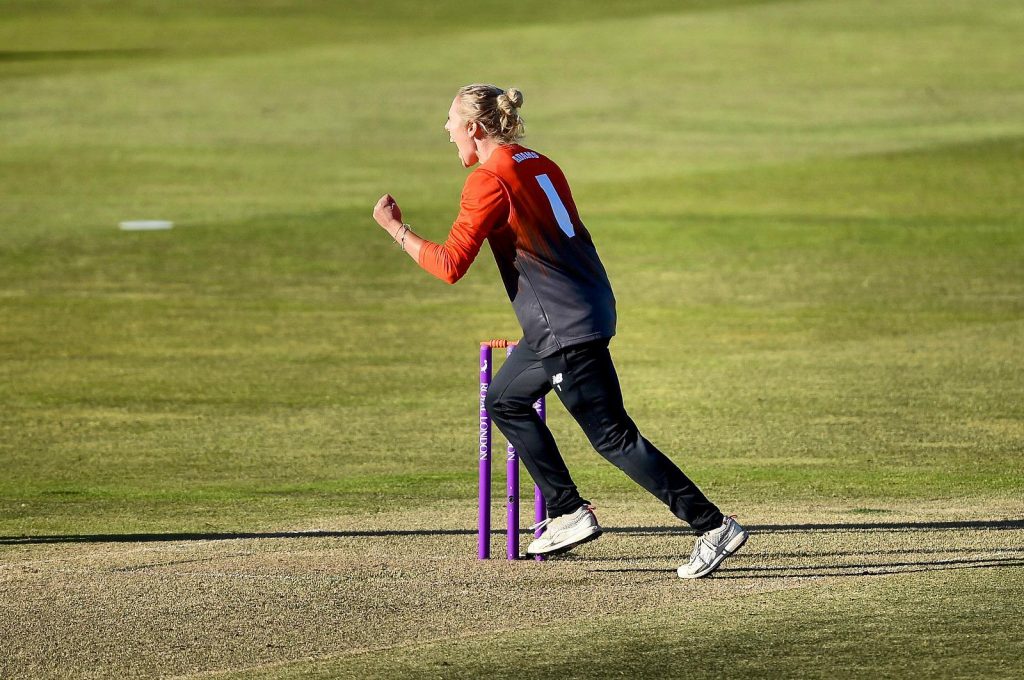
Adams is the daughter of former Sussex captain and England international Chris Adams.
In a recent interview with the podcast It Starts With You, she reveals that watching her father perform really influenced her passion and desire to make it as a professional.
“I spent my weekends down at Hove watching my dad and playing with the other kids and probably causing havoc in the nets. And also, probably getting in trouble with the stewards!”
Unsurprisingly, with her tall and elegant figure, Adams’ sole focus when she was younger wasn’t just on becoming a cricketer.
She explains on the podcast that she used to play netball, but realised quickly that cricket was going to be her eventual destiny.
In her illustrious career so far, the 27-year-old has captained Sussex at county level as well as the Vipers. She has also played for Loughborough Lightning, and is signed to Oval Invincibles for The Hundred.
As a captain, she realises the responsibility that she holds in trying to make the team environment as inclusive and welcoming as possible.
Adams explains: “I think it’s so important that we’re a team and nothing comes between that.
“We support each other on and off the pitch, so whatever people may be going through, we are there for one another and put an arm around someone’s shoulder if they need it.
“And I can’t really fault my teammates in any that I played in.”
Adams has had the privilege of representing England at academy level, featuring in matches against the likes of Sri Lanka.
Personal history, and LGBT+ History Month
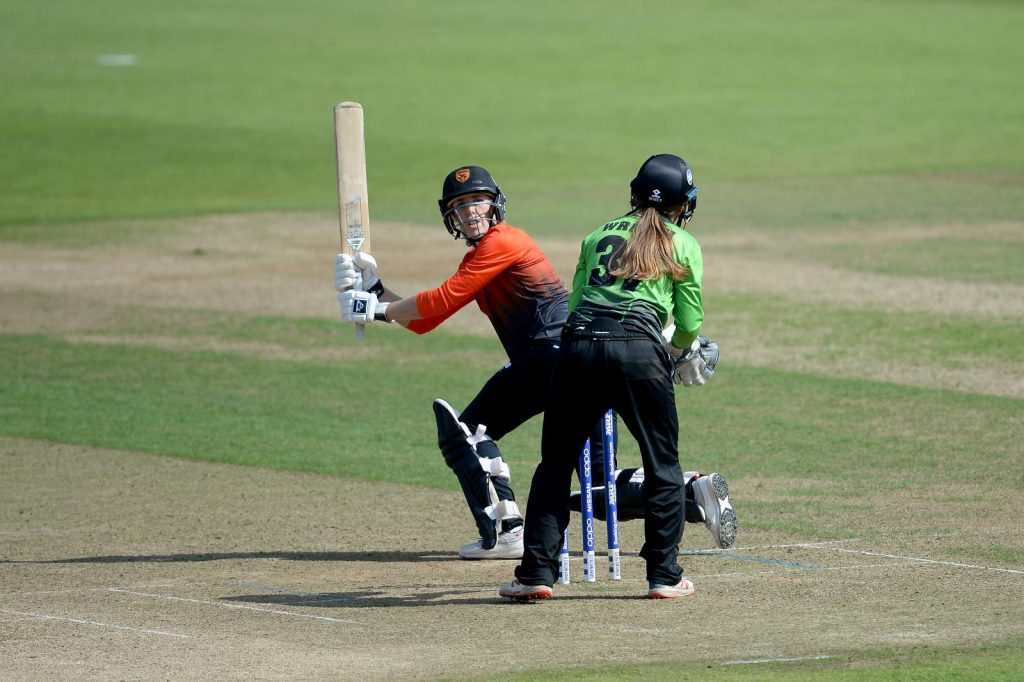
LGBT+ History Month (LGBTHM) and Pride Month are two landmark annual celebrations for the community.
They differ in the sense that LGBTHM retains a specific focus on the past, recognising LGBTQ+ figures from yesteryear who did not enjoy the same freedoms we do now but who paved the way for future generations.
More so than in previous years, sport has come on board with LGBTHM in a big way in the UK in February 2021.
As a result, the likes of Georgia Adams have felt increasingly empowered to feel comfortable in sharing their own personal stories.
Adams’ story points to why there is a need for times in the calendar to be dedicated to a minority community.
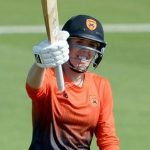
“I went through a phase where I was so worried about what people thought of me. I kind of felt like I had to be someone else to fit in,” Adams reflects. “Especially at college and even post college, I was very much like that.
“I didn’t quite know where I stood or what my sexuality was at the time, but I used to get labelled due to having a best friend who was openly gay.
“I used to get tormented by the boys at college because my best friend was quite openly gay, and she really didn’t care what others thought about her.
“We’ve been best friends from 13 years old and it just was never something that was ever an issue.
“And of course, because I was best friends with her, I was labelled also as gay.
“I ‘had to be gay’ because my best friend was gay and I think that’s when really I was thinking, ‘what is this world that we’re living in?’ I don’t really like labels that much because I just think it’s all about the person being comfortable.
“Be yourself, be happy in your own skin. Moving to Loughborough allowed me to be happy and open about my true self.
“The month is all about people opening up and speaking out and not being afraid to be who they really are.”
Unfortunately, some people believe that the LGBTQ+ community don’t deserve a whole month of reflection to themselves.
Responding to the criticism of why there is no ‘Straight History Month’, Adams points to the fact that it is ‘normalised’ for a person to be heterosexual, implying that a month of action is not necessary.
Adams says: “It’s hard because so many things are getting highlighted. I know there have been similar things with the huge Black Lives Matter campaign, and some people saying it should be ‘all lives matter’.
“I just think the problem is that no one singles out somebody for being straight.
“So it’s hard to have a ‘Straight History Month’ when it’s normalised to be straight. LGBTQ+ people have had to fight tooth and nail for acceptance.”
ECB encouraged to show its support
Does cricket in this country have a cultural problem when it comes to LGBTQ+ inclusion and representation within the sport?
The answer is that most sports have cultural problems, with football being an obvious example.
However, clubs like Leicester City and Fulham have been proactive in their coverage of this year’s LGBT+ History Month.
What has coverage been like in cricket?
Counties including Warwickshire have openly shown their support for LGBTHM, but what about the England and Wales Cricket Board (ECB)?
Adams, like many others, is puzzled as to why there hasn’t been more extensive coverage from the ECB.
“I really don’t know, because I think they’ve got so many opportunities as well with different members within the cricket world, who would be more than happy to speak out about the importance of being comfortable in your own skin.
“So I don’t know if I can put my finger on why they haven’t done it, but it is a shame because you have the likes of Katherine Brunt and Nat Sciver.”
England stars Sciver and Brunt were due to get married last September but delayed their wedding due to the pandemic. Their visibility as a couple in cricket has inspired many since they announced their engagement on Coming Out Day in October 2019.
“They don’t hide it and they are really comfortable with it,” says Adams.
“And they are real advocates for being a married couple playing in the same team together and representing their country.
“So I’m not quite sure why the ECB haven’t exposed it as much as they should have.
“But I know that they can be a bit late to the party at times, so they may come at the last minute!”
Wedding bells on the horizon
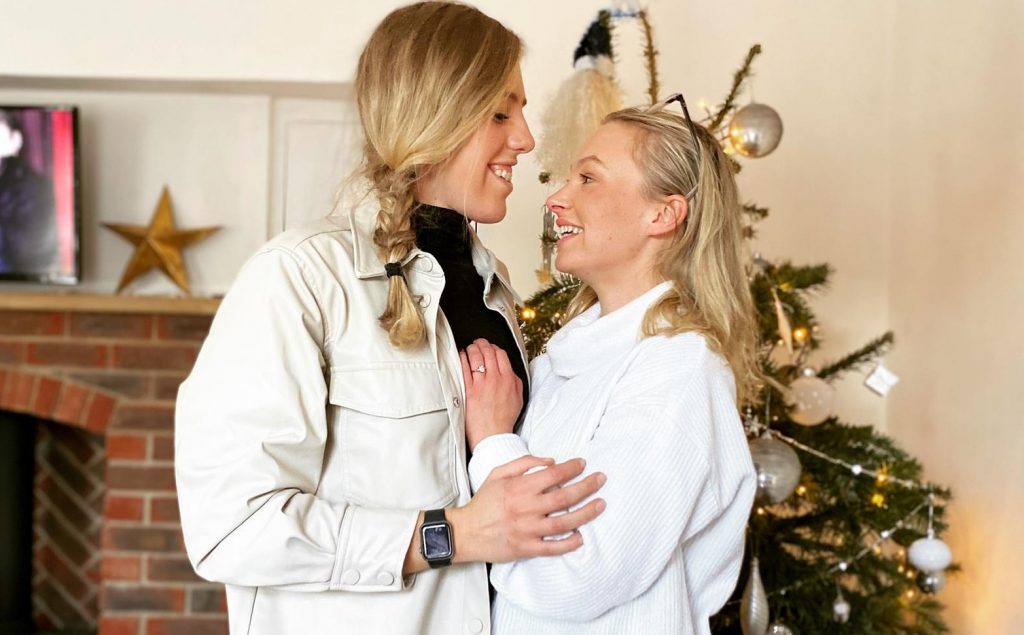
While Adams’ career on the field has been disrupted due to Covid-19, her life off the field has intensified significantly.
Just like Brunt and Sciver plan to do, she will be tying the knot to her partner Amy at the end of October.
“We’ve got a lot of things in place and we’ve actually been a lot better in the last three to four weeks,” Adams admits.
“We’re using lockdown as a bit of time to get everything sorted, but it’s still a bit uncertain.”
Different dynamic in the men’s game
Being able to marry someone of the same sex and being able to play the sport you love reflects the current state of affairs when it comes to the women’s cricket environment.
Unfortunately, this isn’t replicated in the men’s game. In fact, the men’s game suffers a considerable amount with the lack of LGBTQ+ representation at the top level.
Somerset’s Steven Davies is still the only professional player to have come out publicly as gay. He first shared his story with the media in an interview with The Daily Telegraph exactly a decade ago.
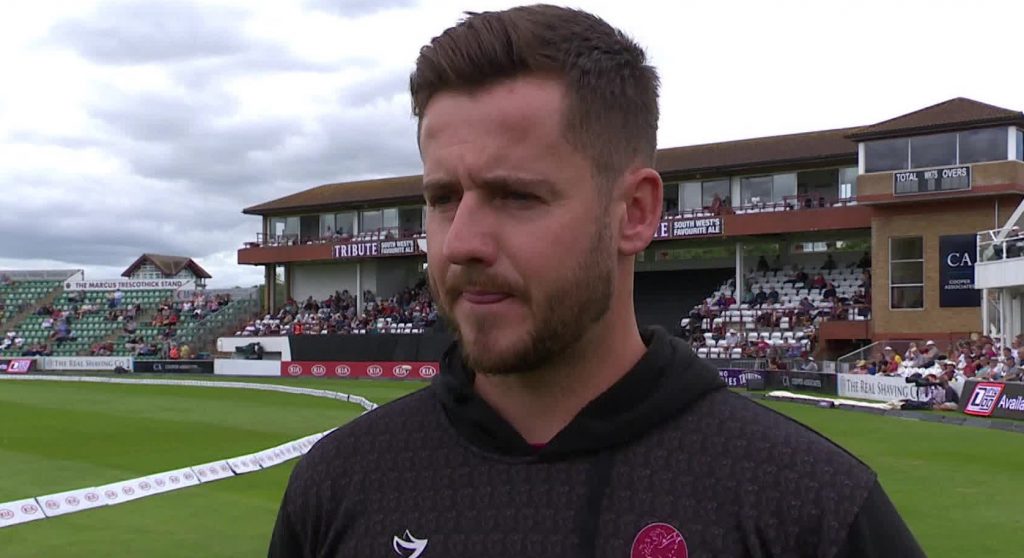
But why is this the case and why is the women’s game so far ahead of the men’s in relation to that type of diversity?
Adams’ father Chris coached Davies when he was at Surrey, and Georgia believes that stereotypes and attitudes within dressing rooms are a key factor preventing the men’s game from becoming more progressive.
“This is a big generalisation, but I think women are much more understanding and have less of an ego, so they get the emotional stuff,” Adams explains. “As a result, they get that words hurt and actions hurt as well, so I can’t sit here and say I’ve had it tough, or I’ve had loads of negativity around being gay, because I haven’t.
“My friends have always supported me and my family is so supportive of my life.
“I really can’t complain, but I do know that my dad was the coach of Surrey and at the time Steven Davies came out as gay when he played for them.
“And he (Davies) felt like he couldn’t shower with the boys because he would get comments, or they would say something like, ‘you are looking at me.’
“That was his interpretation. They might not have done that, but that’s how he felt.
“And again, it’s sad that men have this ego and I guess that matches the image of what male athletes are like.
“Whereas in the female game, there’s not so much of that macho image to live up to that I can imagine.
“It’s incredibly difficult and I have so much respect for Steven.
“I hope other male cricketers can follow his path. Then we may see the men’s game becoming more of an inclusive and welcoming environment.”
Message to younger self

Adams’ journey to becoming the person she is today has been complicated, just like it is for many other LGBTQ+ people.
Battling bravely through adversity and the confusion that arises when realising you are different to the majority is a tricky situation, but Adams has come out the other end and is now a role model to LGBTQ+ girls who aspire to be open about their sexuality and play cricket.
When being asked to send a message back to her younger self about how to deal with the complexities of realising who you are, she summed it up perfectly in two sentences.
“You don’t need to conform or fit in,” Adams advises.
“Just be your true authentic self.”
Our thanks to Georgia – you can also find her on Instagram at @gadams01.
Follow Danyal on Twitter at @DKMatchreports.
Further reading…
LGBTQ+ in Ice Hockey – Read Jay Forster’s series of exclusive interviews
LGBT+ History Month: Sharing stories from UK sport
Sports Media LGBT+ is a network, advocacy, and consultancy group that is helping to build a community of LGBT+ people and allies in sport. We’re also a digital publisher. Learn more about us here.
LGBT+ in sports? Your story could help to inspire other people – you don’t have to be famous to make an impact, and there are huge gains to be made both personally and more widely in sport. Start a conversation with us, in confidence, and we’ll give you the best advice on navigating this part of your journey.
Email jon@sportsmedialgbt.com or send a message anonymously on our Curious Cat.


